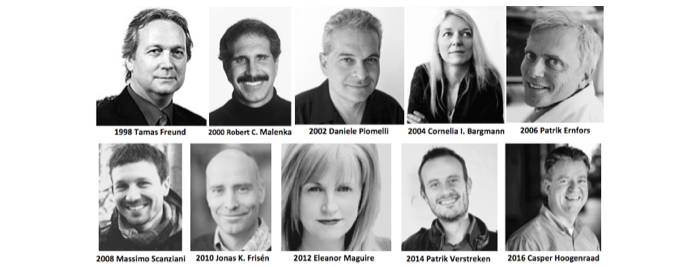
Pictured above (top to bottom, left to right): Recipients of the IBRO Kemali Prize – Tamas Freund (1998), Robert C. Malenka (2000), Daniele Piomelli (2002), Cornelia I. Bargmann (2004), Patrik Ernfors (2006), Massimo Scanziani (2008), Jonas K. Frisén (2010), Eleanor Maguire (2012), Patrik Verstreken (2014), Casper Hoogenraad (2016), Guillermina López-Bendito (2018).
The IBRO Dargut and Milena Kemali International Prize for Research in the field of Basic and Clinical Neurosciences is assigned every two years to an outstanding researcher, under the age of 45, who has made important contributions in the field of Basic and Clinical Neuroscience. The prize award is 25,000 Euros, and the winner is invited to give a featured lecture at the FENS Forum of Neuroscience, the largest international neuroscience meeting in Europe, held every two years on even years.
Prize Recipients
1998, Berlin, Germany
Tamas Freund (Budapest, Hungary) for his outstanding contributions to the organization and chemical characterization of identified neuronal circuits and cell types in the brain, in particular in the hippocampus.
2000 Brighton, UK
Robert C. Malenka (Boston, MA, USA) for his fundamental contributions in the field of synaptic plasticity, in particular long term potentiation and long term depression, and the characterization of the role of silent synapses in these processes.
2002 Paris, France
Daniele Piomelli (Irvine, CA, USA) for his fundamental discoveries concerning the functional roles and regulation of endogenous cannabinoids in the brain and peripheral tissues.
2004 Lisbon, Portugal
Cornelia I. Bargmann (San Francisco, CA, USA) for her fundamental discoveries concerning genes, behavior, and the sense of smell in the nematode C. elegans.
2006 Vienna, Austria
Patrik Ernfors (Stockholm, Sweden) for his outstanding work on the expression and function of neurotrophic factors and neuropeptide and their receptors exploiting transgenic techniques.
2008 Geneva, Switzerland
Massimo Scanziani (San Diego, CA, USA) for his seminal discoveries on how cerebral cortex perceives the environment by showing that cortical circuits operate in an activity-dependent and non-linear fashion using canonical feed-forward and feed-back inhibition circuits as feature detectors of incoming stimuli.
2010 Amsterdam, Netherlands
Jonas Frisén (Stockholm, Sweden) for his pioneering contributions to our understanding of neurogenesis in the central nervous system.
2012 Barcelona, Spain
Eleanor Maguire (London, UK) for her innovative contributions to understanding human memory.
2014 Milan, Italy
Patrik Verstreken (Leuven, Belgium) for his success in undoing the effect of one of the genetic defects that leads to Parkinson’s using vitamin K2.
2016 Copenhagen, Denmark
Casper Hoogenraad (Utrecht, The Netherlands) for his outstanding work on cytoskeleton dynamics and intracellular transport in neural development and synaptic plasticity.
2018 Berlin, Germany
Guillermina López-Bendito (Alicante, Spain) for her outstanding work on mechanisms of axon guidance in brain development, and in particular in thalamocortical connectivity.







Thank you for the info. !